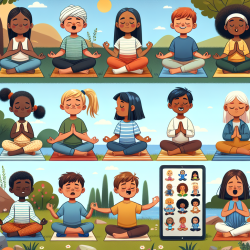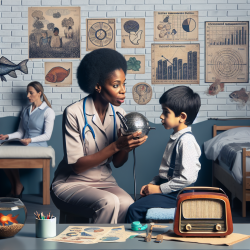In the bustling world of education and therapy, finding effective ways to support children with developmental disabilities is crucial. TinyEYE understands the unique challenges faced by these children and their caregivers. This blog explores how incorporating mindfulness into their routine, specifically on Mondays, can set a positive tone for the entire week.
The Monday Effect: A Fresh Start
The concept of "Healthy Monday" is based on the idea that starting a new habit at the beginning of the week increases the likelihood of sustaining it. For children with developmental disabilities, this can mean beginning each week with a mindful practice that promotes emotional regulation and overall wellbeing.
Understanding Developmental Disabilities
Developmental disabilities encompass a range of conditions characterized by impairments in physical, learning, language, or behavioral areas. Common conditions include ADHD, Autism Spectrum Disorder, and intellectual disabilities. These challenges often require specialized care and attention, especially concerning mental health.
How Mindfulness Helps
Research suggests that mindfulness-based interventions (MBIs) can significantly benefit children with developmental disabilities. These practices help reduce aggressive behaviors and improve self-awareness by teaching children to focus on their sensations, thoughts, and emotions.
By cultivating mindfulness habits on Mondays, children can begin their week with a sense of calm and focus. This practice not only aids emotional regulation but also fosters independence as they learn to manage stress constructively.
Engaging Mindfulness Activities
Here are some fun and effective activities designed to promote mindfulness among children:
- Breathing Ball: Use a breathing ball as a visual aid to guide children's breathing patterns, helping them match their breath to the ball's movement.
- Roller Coaster: Encourage deep breathing by tracing fingers up and down the opposite hand's fingers while coordinating breath with the movement.
- Rocks & Socks: This activity involves making fists ("rocks") and then relaxing them ("socks"), teaching tension release through breathing.
- Sensing the Senses: Engage all senses by identifying things they can see, touch, hear, smell, and taste in their environment.
- Breathing Buddies: Use small toys on their stomachs as they breathe deeply to visually track their breathing patterns.
- A Mindful Bite: Focus on eating a snack slowly while noticing its taste, texture, and aroma.
- Play with Playdoh: Encourage creativity and stress relief by playing with Playdoh while noticing its texture and smell.
- Nature Walk: Explore surroundings actively while being mindful of sensory inputs like sounds, smells, and tactile sensations.
The Long-Term Benefits
The regular practice of these activities can lead to lasting improvements in emotional regulation and psychological wellbeing. By embedding these practices into their weekly routine—starting each Monday—children can develop better coping mechanisms for stressors they encounter throughout their lives.
TinyEYE is committed to providing supportive resources that empower children with developmental disabilities. For more information on how mindfulness can be integrated into daily routines for maximum benefit, please follow this link.










